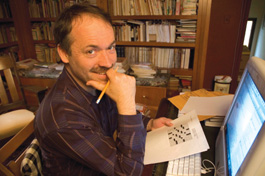home | metro silicon valley index | movies | current reviews | film review

I Think, Therefore Amah: Will Shortz spends his days (and probably his nights) thinking up obscure answers to clever clues for crossword puzzles.
The Lettermen
'Wordplay' tracks the life of crossword puzzle nuts across and down the country
By Richard von Busack
AS A PASTIME during travel, a home remedy for Alzheimer's or a way to increase your vocabulary and irritate people, the crossword puzzle has been a good friend since its inception many decades ago. It has kept green the memory of stage great Ina Claire. It has reminded thousands of the mighty river Aa. Even though vegetarianist schools have yanked "A Dissertation on Roast Pig" from the English textbooks, the crossword puzzle keeps alive the important fact that Charles Lamb's pen name was "Elia."
Wordplay is Patrick Creadon's sometimes engaging, sometimes dozeworthy documentary about Will Shortz, current puzzlemaster at NPR and The New York Times. After creating his own major at Indiana University—"enigmatology," a field fitting one for work as a Batman villain—Shortz became editor of the 64-year-old New York Times crossword puzzle. As such, he regularly baffles the celebrity guests seen onscreen cracking his codes. These famous names include the Indigo Girls, relaxing in an empty summery amphitheater before their show, mulling over their 34 acrosses and 28 downs. Ken Burns testifies—the scene has the quality of testimony recorded during a legal hearing—that he, too, is a puzzle fan. The camera studies Bill Clinton as he pauses over the question of a four-letter word for missile. "Let's see, that would be MIRV or ICBM," drawls the man who at one point might have had to launch them. Clinton's former rival Bob Dole recalls a particularly fabled puzzle printed on Election Day, in which either he or Clinton could have been the answer. And Jon Stewart, looking cornered and uncomfortable off-script, playfully calls Shortz out to do his worst.
We learn a lot about how the puzzles work. Freelancers, for instance, provide some of these devilish little newspaper mazes. The puzzles must have bilateral symmetry, which makes them as tough to create as they are to solve. Surprisingly, even as newspapers begin to reflect the steadily coarsening vocabulary of their readers, editorial standards keep bodily functions out of the answers. "Urine," with its three vowels, would be a very useful word, one puzzler says regretfully; ironically, it's banned from a puzzle in the same newspaper with splash ads (so to speak) for Urinetown.
In between celebrity guests, Creadon—a frequent contributor to PBS—documents a trip to the annual American Crossword Puzzle Tournament in Stamford, Conn. There, a variety of nationwide competitors vie (a three-letter word for "struggle") for a trophy under speed trials, and they have the added pressure of solving the riddles in front of a live audience of their peers. We learn a useful few words during this session, such as "oscine," a noun meaning the order of songbirds. Still, the interviews with the participants are glancing, like sound bites. Unlike the adorable geek kids in the spelling-bee movies, the adults who compete here have the eye of the tiger and careers behind them. We're stuck watching them at their fun, and so utterly telegenic is this documentary that one fancies a voice coming on the soundtrack: "You're watching CPC, the Crossword Puzzle Channel."
![]() Wordplay (PG; 85 min.), a film by Patrick Creadon, opens June 23.
Wordplay (PG; 85 min.), a film by Patrick Creadon, opens June 23.
Send a letter to the editor about this story.
|
|
|
|
|
|